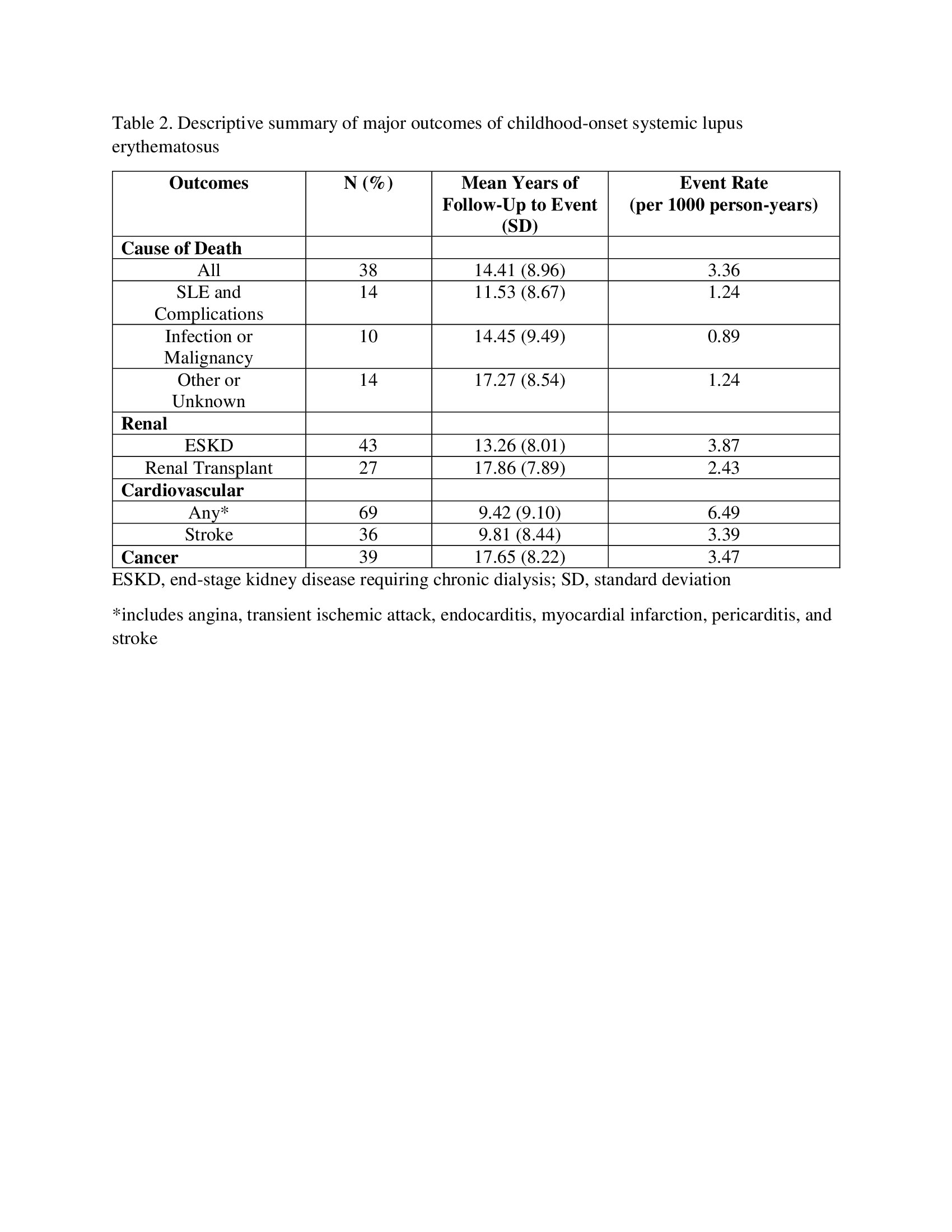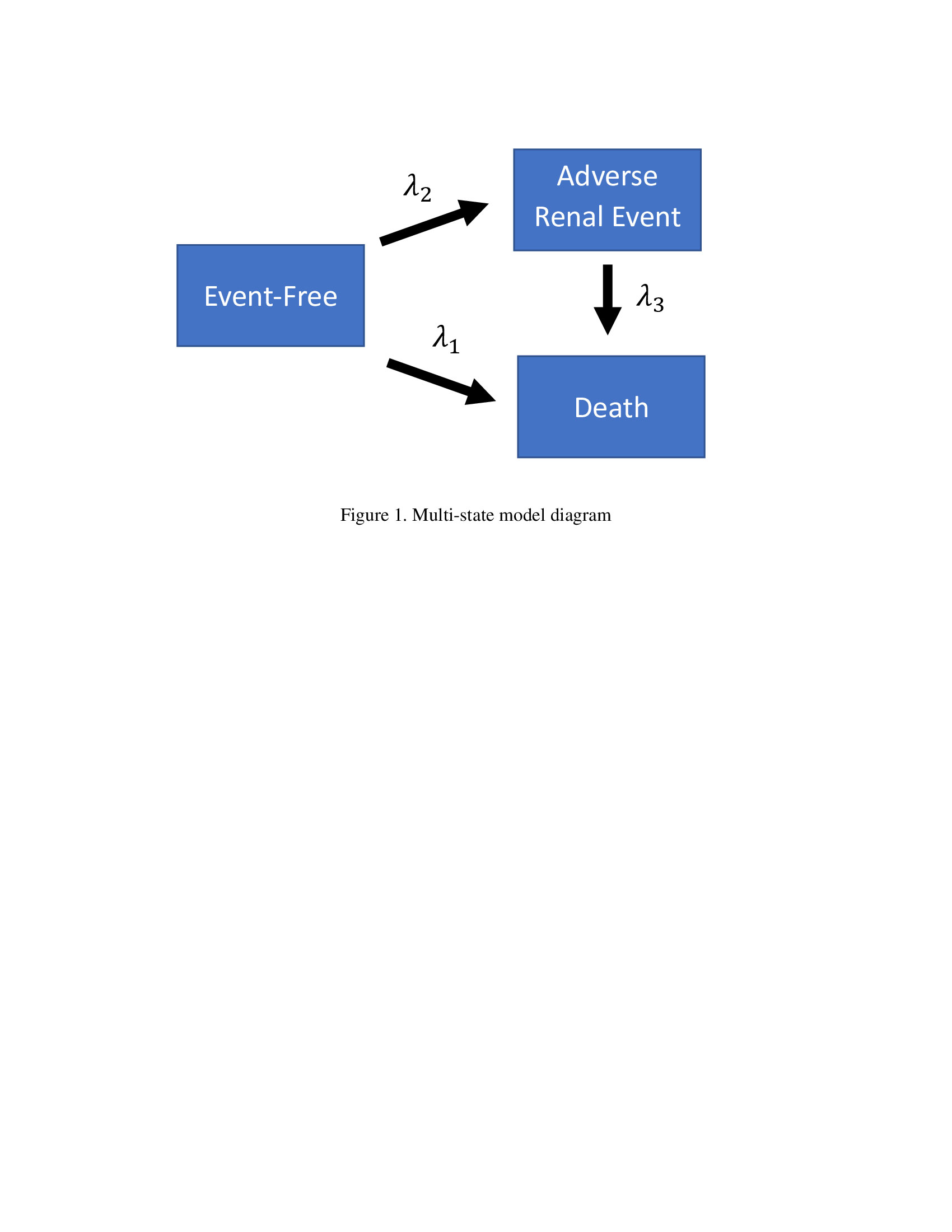Session Information
Date: Sunday, November 13, 2022
Title: Pediatric Rheumatology – Clinical Poster II: Connective Tissue Disease
Session Type: Poster Session C
Session Time: 1:00PM-3:00PM
Background/Purpose: The long-term morbidity and mortality of childhood-onset SLE (cSLE) after transition to adult care is not well documented. The present study aims to fill this knowledge gap by analyzing outcomes in a large province-wide cSLE clinical cohort linked to multiple administrative healthcare databases. Our objectives were to: 1) determine all-cause and cause-specific mortality rates, adverse renal event rates, cardiovascular event rates, and cancer event rates in cSLE; and 2) determine baseline characteristics associated with higher rates of transition between 3 different states: event-free (entry), adverse renal event, and death.
Methods: Clinical data were abstracted for cSLE patients (< 18 years at diagnosis) diagnosed between January 1990 and March 2011 and followed for ≥1 year after contacting all pediatric and adult rheumatologists and nephrologists practicing in Ontario. Data and Ontario Health Insurance Plan (OHIP) numbers were securely transferred to the Institute for Clinical and Evaluative Sciences (ICES). OHIP numbers were transformed into an encrypted ICES key number (IKN) used to link the cohort to multiple administrative datasets to determine the outcomes of interest. We examined descriptive summaries of major outcomes including death, adverse renal events (end-stage kidney disease [ESKD] requiring chronic dialysis and renal transplant), cardiovascular events (including angina, transient ischemic attack, endocarditis, myocardial infarction, pericarditis, stroke), and cancer. In addition, we modeled the disease progression with a multi-state Cox model to determine baseline demographic and clinical characteristics that were significantly associated with higher rates of transition from being event-free to experiencing an adverse renal event, from being event-free to experiencing death, and from experiencing an adverse renal event to experiencing death.
Results: There were 38 deaths in a cohort of 615 patients with the mean follow-up time of 14.4 person-years. The all-cause mortality rate was 3.36 per 1000 person-years. The rates for end-stage kidney disease (ESKD) requiring chronic dialysis and renal transplant were 3.87 and 2.43 per 1000 person-years, respectively. The rate for any type of cardiovascular event and cancer were 6.49 and 3.47 per 1000 person-years, respectively. The multi-state Cox model indicated that the Black ethnic group (HR, 3.58; 95% CI, 1.6-8.0) and the presence of renal involvement at baseline (HR, 2.19; 95% CI, 1.2-4.1) were significantly associated with higher rates of transition from event-free to adverse renal event. Additionally, the Black ethnic group (HR, 5.45; 95% CI, 1.6-18.8) was significantly associated with higher rates of transition from event-free to death. None of the variables were significantly associated with higher rates of transition from adverse renal event to death.
Conclusion: In this large Canadian multi-ethnic long-term cSLE cohort, ethnicity was associated with adverse outcomes including adverse renal events and death. Further analyses will help inform risk for adverse outcomes to improve clinical care for the highest risk patients.
To cite this abstract in AMA style:
Jeoung H, Liu K, Berard R, Fidler W, Pope J, Roth J, Thorne C, Silverman E, Levy D. Childhood-onset Systemic Lupus Erythematosus: Long-term Outcomes in a Large Multi-ethnic Ontario Cohort [abstract]. Arthritis Rheumatol. 2022; 74 (suppl 9). https://acrabstracts.org/abstract/childhood-onset-systemic-lupus-erythematosus-long-term-outcomes-in-a-large-multi-ethnic-ontario-cohort/. Accessed .« Back to ACR Convergence 2022
ACR Meeting Abstracts - https://acrabstracts.org/abstract/childhood-onset-systemic-lupus-erythematosus-long-term-outcomes-in-a-large-multi-ethnic-ontario-cohort/



